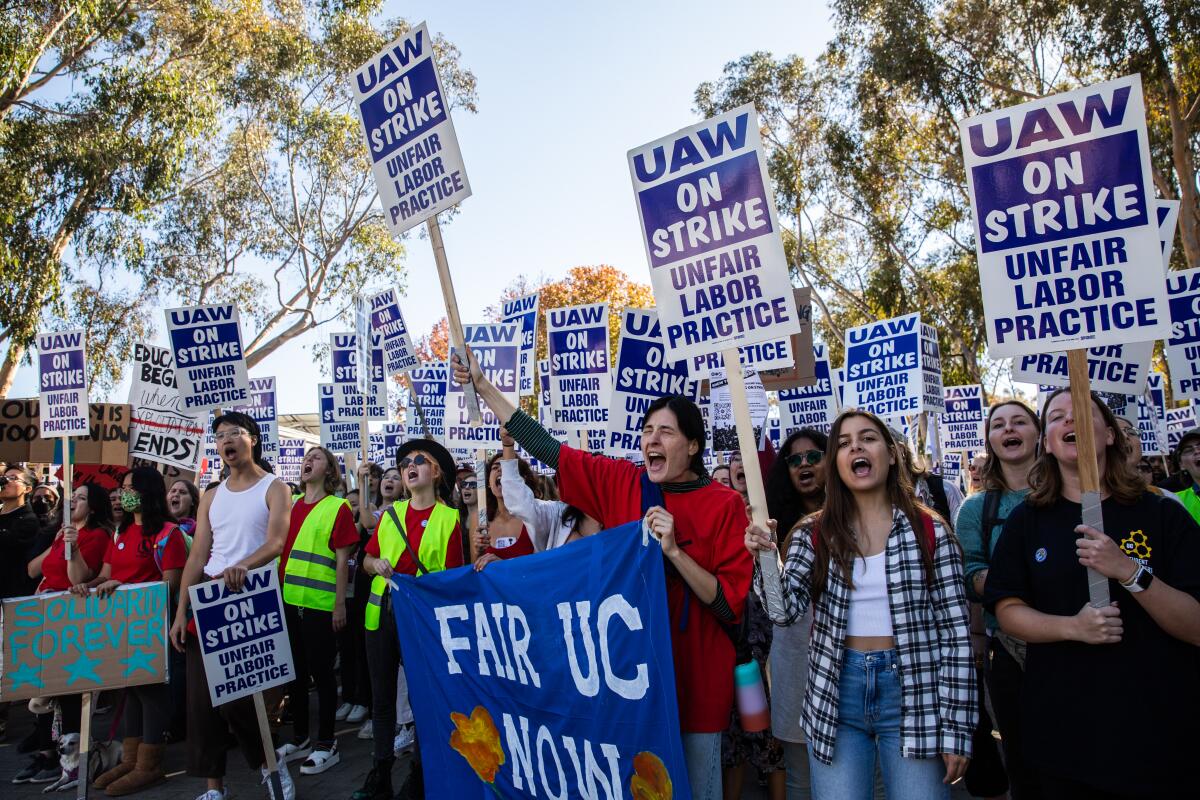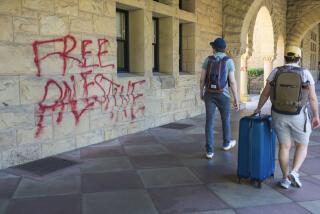Dozens of UCSD graduate students face possible discipline after May 5 protest

- Share via
SAN DIEGO — UC San Diego graduate students are facing disciplinary hearings and possible expulsion after interrupting an alumni awards ceremony to accuse university administrators of failing to live up to the requirements of a union contract brokered in 2022.
According to statements by United Auto Workers 2865, which represents more than 36,000 UC student researchers, teaching assistants, tutors and readers statewide, a total of 67 students are facing academic discipline after staging a demonstration on May 5.
As a livestreamed video on Twitter shows, students streamed onto the stage during an alumni awards ceremony held outdoors at the Museum of Contemporary Art San Diego to protest what they say is the university’s failure to abide by a contract that specifies significant wage increases for workers who staged a five-week strike in late 2022, shutting down classes and delaying grading at University of California campuses statewide.
Maya Gosztyla, a union organizer and doctoral candidate in biology, said she and many others received letters from UCSD’s student affairs office in early June that alleged violations of student conduct procedures, including prohibitions against physical assault and threatening conduct.
Students say they are especially concerned about allegations of assault, indicating that, if sustained, such accusations could result in expulsion.
“At first, I thought this was clearly a mistake,” Gosztyla said. “We livestreamed the whole event, and nobody came near anybody.
“It is clearly an intimidation tactic. Being charged with assault even if you know for sure you didn’t commit any crimes, that’s a really scary charge to see, especially for someone like me who’s now four years into my PhD and has about two years left.”
The letter that student protesters received does not specifically list expulsion as the main goal of the disciplinary process. The university’s Policies Applying to Campus Activities, Organizations and Students, which is cited in student letters, lists a range of potential punishments for those found to have violated school conduct rules ranging from warning and censure to suspension and dismissal. An appeal process also allows students to challenge violation decisions.
A statement sent by email from the university indicates that students will have multiple opportunities “to tell their side of the story” during disciplinary hearings:
“If at any time it is determined that there is not reasonable cause to believe that a violation of the Standards of Conduct may have occurred, the student involved is promptly informed that no further action will be taken.”
As to the decision to protest, the university said: “If unions or individual union members believe that the university is not in compliance with its contractual commitments, collective bargaining agreements establish orderly processes to file grievances and have them adjudicated. Calculated disruption of official university business is never appropriate.”
Gosztyla provided a copy of the letter she received from the university and a copy of an incident report that accompanied the notice. She redacted all but her name from the documents in order to protect the identities of others who have been charged, but who have not given their consent for publication.
Though the university has so far declined to discuss the details of specific charges citing laws that protect student privacy, the narrative included in the incident report states that protesters “bumped” UCSD Chancellor Pradeep Khosla when taking the stage. Students, according to the university account, “took the microphone away” from the chancellor, and he “stumbled but did not fall off the stage.”
It is difficult to verify these specific details in the recorded livestream of the event posted to social media. The video is grainy and difficult to make out in several spots. However, Gosztyla disputed those statements, insisting “there was no physical contact at all” and providing a photo, which she did not have permission to have published, that shows one protester standing next to the chancellor and speaking into a microphone attached to a lectern.
“The report is incorrect in saying that someone ‘took his mic,’” she said.
According to the incident report, the event, which cost “over $100,000 to produce” and featured award winners who “came from as far away as Switzerland,” was forced to move inside where pre-recorded video tributes to recipients could not be shown in their best light “because there was not similar video capability inside the museum.”
Further, the university narrative indicates that some had safety concerns beyond the group allegedly bumping and surrounding Khosla, with some “concerned about the shock effect the incident could have had on older attendees.”
The event, UCSD’s 44th annual Alumni Awards Celebration, honored four accomplished graduates: land use and transportation planner Coleen Frost, chemist Ann S. Tsukamoto, chief executive Scott S. Park and ocean scientist Alfredo Giron Nava.
These four honorees each have long lists of accomplishments that were to be celebrated at the event. Asked why she and her fellow union members felt it was necessary to turn a celebration into a labor protest, Gosztyla said that the group felt it was being ignored, having attempted to go through proper channels for months without result.
“Disrupting an awards ceremony, to me, causes less harm than stealing thousands of dollars from thousands of workers,” she said. “I recognize that maybe some people may have been upset at this event and felt like it wasn’t their problem, but, to me, I think that’s just the nature of protesting and speaking out against abuse.”
Union members have said the university has charged a large group of protesters, including more than a dozen who were not present at the event on May 5.
Adam Cooper, who said he hopes to graduate with a doctorate in chemistry by December, said he received a notice of student conduct violations, including assault, despite not being present. He was scheduled, he said, for a university hearing Wednesday. Cooper said a witness identified him in a photo of demonstration participants, but he has his own witness and photos proving he was on campus. He said he was having difficulty accessing the photo or photos that the university is using to prove he was present, but added that he has his own evidence that he was on campus, including a staff member who saw him there at the time of the demonstration at the museum.
“I sent them time-stamped photos I took at the [Scripps Institution of Oceanography] pier; [I’m] not sure when I hear back if they will drop the charges,” Cooper said.
Even if the charges are dropped, he said, he worries about future repercussions.
“Even if it does get resolved, they’ll still stay on my student conduct record,” he said. “I’m concerned it will show in background checks, because I’m planning on applying for jobs that might require a security clearance in the future.”
An online petition that demands disciplinary charges be dropped lists 95 signatures from UCSD faculty and many more from academics associated with other organizations.
The UC San Diego Faculty Assn. is also listed in support of dropping charges, and Sal Nicolazzo, the organization’s secretary and treasurer and UCSD associate professor in the Department of Literature, confirmed that its governing board voted to sign the petition on June 16.
The association is a membership organization and thus does not represent all UCSD faculty. That duty falls to the university’s Academic Senate — a formal part of the university’s shared governance structure. In an emailed statement, the senate said: “Although we are following these cases closely, the Academic Senate plays no role in issues of student conduct outside of classroom instruction, and for that reason it would not be appropriate for us to comment on the case.”
More to Read
Sign up for Essential California
The most important California stories and recommendations in your inbox every morning.
You may occasionally receive promotional content from the Los Angeles Times.














